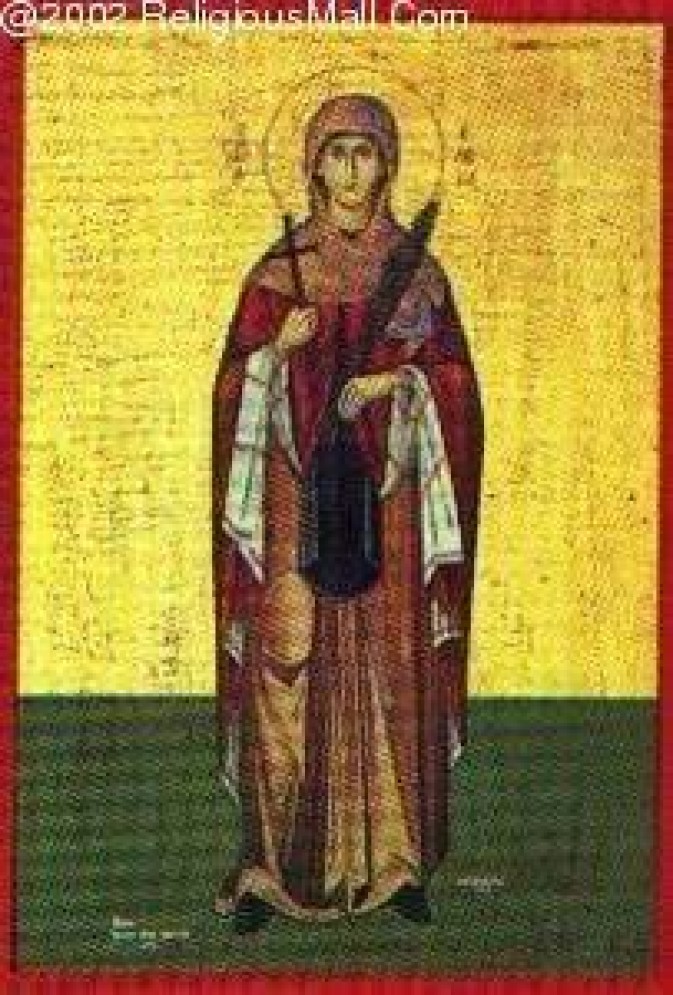Elesa of Kythera
Elesa of Kythera
Available to purchase from,
http://www.religiousmall.com
What I like about the "religiousmall" icons is the great number of variations in which the icons can be purchased.
[With/without frame, history, 3-dimensional embellishments on frame, individually made, etc etc.]
Note when searching the "religiousmall" site - that they spell Elesa with one "s", a convention which (given Spyro Calocerinos's comments below), and the evidence from the two church service books (immediately) below, I intend to adopt.
Page from Ayia Elesa's church servive, 1886
Page from Ayia Elesa's church servive, 1961
Greek spelling: ΕΛΕΣΗΣ
Ayia Elesa: life story.
[From the Kytheriaki Ithea site:]
http://www.kytheraismos.gr/kythidea/pdf/travel2003/trkb07.pdf
The Monastery of Agia Elesa was built in
1871 on the peak of a mountain 433 mtrs high with impressive views.
It was built in memory of the tragic St. Elesa who was the daughter of an army officer, an idol worshipper from the Peloponnese.
Elesa, a Christian, fled to Kythera to
get away from her father who was angered by her refusal to marry the man he had chosen for her. She disembarked at Melidoni, Kythera in 375 A.D. determined lead a life of a nun instead.
On the way up to the mountain, she begged the Lord to open the ground at her feet so that she could hide from her father who was in close pursuit. The earth beneath her feet cracked open but her father was already there, waiting for her. She underwent terrible torture at the hands of her father.
He whipped her, hung her from a carob tree and finally decapitated her. Her grave today is located in the Monastery’s courtyard and the church commemorates her memory every 1st August.
ELESA: biography, martryed, 1.8.375.
Translated from the German, (and grammatically "re-engineered" by GCP);
Fr. Heyer: The holy ones on the island Viten and Hymnen from Aegaeis and Adria, 1991, 242-247.
www.bautz.de/bbkl/e/elessa
Arrived on Kythera at the time the Christian faith was just beginning to "take root" on the island.
She came to Kythera to escape her parents. She wanted to live the reclusive life in order to devote herself to God and Christ.
"During a period when her father was absent for a long tiume, Elesa availed herself of the opportunity to escape.
Elesa sought to lead a spiritual life, focused on Evangelist virtues, devoted to prayer. She also wanted to maintain her virginity. She chose Kythera as a place which was isolated and secluded, and far from her paternal home.
Kytherians treated Elesa and her religion - "as black barley" - ie. not very favourably. [Black barley can't be ground down to flour; and tastes bad].
After returning from his journey, and noticing her "escape", Elesa's father rented a ship, and searched for her, until he found her.
In the report it states how: "in such a way also Elladios rented the ship, took a number of men with him, and sailed to Kythera, in order to look for his daughter Elesa. They thoroughly searched the island.
They found Elesa alive, living her ascetic lifestyle on one of the highest mountain summits in the southern part of Kythera. "...after a long discussion between father and daughter, Eladdios beheaded his daughter Elesa."
At her grave-site, remarkable healing miracles have been reported. Particularly on her Feast Day, August 1st.
The inhabitants of the island sing the following in her honour: "..The Elesa Island Kythera is honoured to have you, good virgin, holy witness of Christ, because it, the island, is blessed by your arrival, because you were transformed into complete heavenly mercy on the island".
Images, at kythera-family
View of the whole church of Ayia Elesa
Church in the Monastery at Ayia Elesa, looking upwards to the tower
Sunset at Ayia Elesa
Interior of the Church of Ayia Elesa
Ayia Elesa Church service, August 1st
Ayia Elesa, Priests conducting Church service, August 1st
Pourko, village at the base of Ayia Elesa
